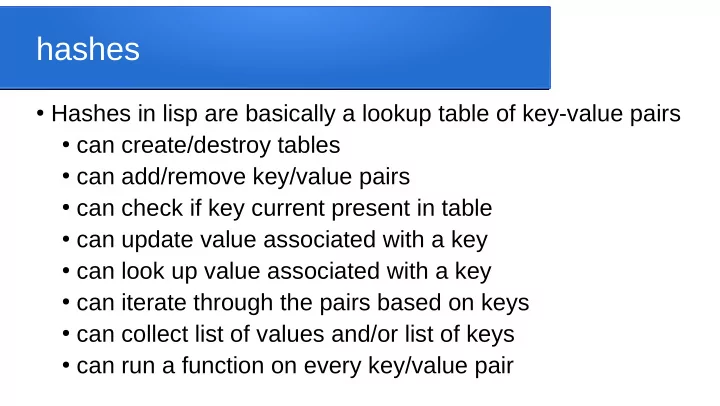

hashes ● Hashes in lisp are basically a lookup table of key-value pairs ● can create/destroy tables ● can add/remove key/value pairs ● can check if key current present in table ● can update value associated with a key ● can look up value associated with a key ● can iterate through the pairs based on keys ● can collect list of values and/or list of keys ● can run a function on every key/value pair
Basic hash table functions create/return an empty table, here storing in var myTable ● (setf myTable (make-hash-table)) Look up size of table (number of pairs) ● (hash-table-count myTable) add/update key value pair, k is my key, v is new value ● (setf (gethash k myTable) v) remove key/value pair ● (remhash k myTable) lookup value associated with key (nil if key not present) ● (gethash k myTable)
What if nil values are ok? (setf result (gethash k myTable)) ● ● If result is nil we don’t know if value was really nil, or whether there is no key-value pair for k gethash actually returns second value, t if found, nil if not, ● (capture using nth-value or multiple-value-bind ) (multiple-value-bind (v status) (gethash k myTable) (if (status) (format t “found value ~A~%” v) (format t “no such key/value pair present~%”)))
Iterating through keys ● Special syntax set up through macros (loop for k being the hash-keys of myTable do ; ... body of your loop, doing whatever with k, e.g. (format t “next pair is ~A:~A~%” k (gethash k myTable))) ● Yes, that really is the actual syntax for the loop! (assuming you want to use k as the variable for the next key and myTable is the variable containing your hash table)
Collecting lists of keys, values, or both ● Again, special syntax set up through macros ● The following returns a list of the keys of myTable (loop for key being the hash-keys of myTable collect key) ● Or, to get a list of the values (loop for key being the hash-keys of myTable collect (gethash key myTable)) ● Or, to get a list of key/value pairs (loop for key being the hash-keys of myTable collect (list key (gethash key myTable)))
Running a function on each pair ● The function we want to run, e.g. myFunction , needs to expect two parameters, the key and the value ● It will get run on every pair, but the order of pairs is not easily predictable ● We’ll pass the function name and the table as parameters to maphash (another ‘higher order’ function), e.g. (maphash ‘myFunction myTable)
Recommend
More recommend